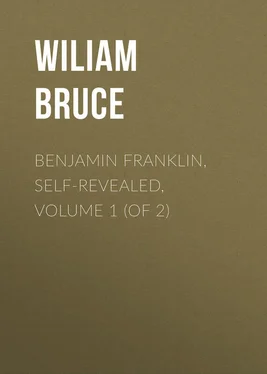Wiliam Bruce - Benjamin Franklin, Self-Revealed, Volume 1 (of 2)
Здесь есть возможность читать онлайн «Wiliam Bruce - Benjamin Franklin, Self-Revealed, Volume 1 (of 2)» — ознакомительный отрывок электронной книги совершенно бесплатно, а после прочтения отрывка купить полную версию. В некоторых случаях можно слушать аудио, скачать через торрент в формате fb2 и присутствует краткое содержание. Жанр: foreign_antique, foreign_prose, на английском языке. Описание произведения, (предисловие) а так же отзывы посетителей доступны на портале библиотеки ЛибКат.
- Название:Benjamin Franklin, Self-Revealed, Volume 1 (of 2)
- Автор:
- Жанр:
- Год:неизвестен
- ISBN:нет данных
- Рейтинг книги:5 / 5. Голосов: 1
-
Избранное:Добавить в избранное
- Отзывы:
-
Ваша оценка:
- 100
- 1
- 2
- 3
- 4
- 5
Benjamin Franklin, Self-Revealed, Volume 1 (of 2): краткое содержание, описание и аннотация
Предлагаем к чтению аннотацию, описание, краткое содержание или предисловие (зависит от того, что написал сам автор книги «Benjamin Franklin, Self-Revealed, Volume 1 (of 2)»). Если вы не нашли необходимую информацию о книге — напишите в комментариях, мы постараемся отыскать её.
Benjamin Franklin, Self-Revealed, Volume 1 (of 2) — читать онлайн ознакомительный отрывок
Ниже представлен текст книги, разбитый по страницам. Система сохранения места последней прочитанной страницы, позволяет с удобством читать онлайн бесплатно книгу «Benjamin Franklin, Self-Revealed, Volume 1 (of 2)», без необходимости каждый раз заново искать на чём Вы остановились. Поставьте закладку, и сможете в любой момент перейти на страницу, на которой закончили чтение.
Интервал:
Закладка:
I still have Enjoyment in the Company of my Friends; and, being easy in my Circumstances, have many Reasons to like living. But the Course of Nature must soon put a period to my present Mode of Existence. This I shall submit to with less Regret, as, having seen during a long Life a good deal of this World, I feel a growing Curiosity to be acquainted with some other; and can chearfully, with filial Confidence, resign my Spirit to the conduct of that great and good Parent of Mankind, who created it, and who has so graciously protected and prospered me from my Birth to the present Hour.
At times, his unfailing humor or graceful fancy even plays lambently over the same stern prospect. In a letter to Mrs. Hewson, written four years before his death, he mentions cards among his amusements, and then adds:
I have indeed now and then a little compunction in reflecting that I spend time so idly; but another reflection comes to relieve me, whispering, " You know that the soul is immortal; why then should you be such a niggard of a little time, when you have a whole eternity before you? " So, being easily convinced, and, like other reasonable creatures, satisfied with a small reason, when it is in favour of doing what I have a mind to do, I shuffle the cards again and begin another game.
"We were long fellow labourers in the best of all works, the work of Peace," he wrote to David Hartley, when the writer was on the point of returning to America from France. "I leave you still in the field, but having finished my day's task, I am going home to go to bed ! Wish me a good night's rest, as I do you a pleasant evening." This was but another way of expressing the thought of an earlier letter of his to George Whatley, "I look upon Death to be as necessary to our Constitution as Sleep. We shall rise refreshed in the Morning."
Your letter [he said to another friend, Thomas Jordan] reminds me of many happy days we have passed together, and the dear friends with whom we passed them; some of whom, alas! have left us, and we must regret their loss, although our Hawkesworth (the compiler of the South Sea discoveries of Capt. Cook) is become an Adventurer in more happy regions; and our Stanley (the eminent musician and composer) gone, "where only his own harmony can be exceeded."
Many of these letters, so full of peace and unflinching courage, it should be recollected, were written during hours of physical debility or grievous pain.
Every sheet of water takes the hue of the sky above it, and intermixed with these observations of Franklin, which were themselves, to say the least, fully as much the natural fruit of a remarkably equable and sanguine temperament as of religious confidence, are other observations of his upon religious subjects which were deeply colored by his practical genius, tolerant disposition and shrewd insight into the imperfections of human institutions and the shortcomings of human character. With the purely theological and sectarian side of Religion he had no sympathy whatever. It was a source of regret to him that, at a time in his boyhood, when he was consuming books as insatiably as the human lungs consume oxygen, he should have read most of the treatises "in polemic divinity," of which his father's little library chiefly consisted. In a letter to Strahan, when he was in his thirty-ninth year, he said that he had long wanted a judicious friend in London to send him from time to time such new pamphlets as were worth reading on any subject, "religious controversy excepted." To Richard Price he imparted his belief that religious tests were invented not so much to secure Religion itself as its emoluments, and that, if Christian preachers had continued to teach as Christ and His Apostles did, without salaries, and as the Quakers did even in his day, such tests would never have existed. "When a Religion is good," he asserted, "I conceive that it will support itself; and, when it cannot support itself, and God does not take care to support, so that its Professors are oblig'd to call for the help of the Civil Power, it is a sign, I apprehend, of its being a bad one." A favorite saying of his was the saying of Richard Steele that the difference between the Church of Rome and the Church of England is that the one pretends to be infallible and the other to be never in the wrong. "Orthodoxy is my doxy and Heterodoxy your doxy," is a saying which has been attributed to him as his own. His heart went out at once to the Dunkers, when Michael Welfare, one of the founders of that sect, gave, as his reason for its unwillingness to publish the articles of its belief, the fact that it was not satisfied that this belief would not undergo some future changes for the better with further light from Heaven.
This modesty in a sect [he remarks in the Autobiography ] is perhaps a singular instance in the history of mankind, every other sect supposing itself in possession of all truth, and that those who differ are so far in the wrong; like a man traveling in foggy weather, those at some distance before him on the road he sees wrapped up in the fog, as well as those behind him, and also the people in the fields on each side, but near him all appears clear, tho' in truth he is as much in the fog as any of them.
The great meeting-house built at Philadelphia, when George Whitefield had worked its people into a state of religious ecstasy by his evangelistic appeals, and the circumstances, under which Franklin was elected to fill a vacancy among the Trustees, appointed to hold this building, were two things of which he speaks with obvious pleasure in the Autobiography . The design in erecting the edifice, he declares, was not to accommodate any particular sect but the inhabitants of Philadelphia in general, "so that even if the Mufti of Constantinople were to send a missionary to preach Mohammedanism to us, he would find a pulpit at his service." The Trustees to hold this building were each the member of some Protestant sect. In process of time, the Moravian died, and then there was opposition to the election of any other Moravian as his successor. "The difficulty then was," Franklin tells us, "how to avoid having two of some other sect, by means of the new choice.
"Several persons were named, and for that reason not agreed to. At length one mention'd me, with the observation that I was merely an honest man, and of no sect at all, which prevail'd with them to chuse me."
The manner in which Franklin came to occupy this position of sectarian detachment is also set forth in the Autobiography . On his father's side, he was descended from sturdy pietists, to whom the difference between one sect and another did not mean merely polemical warmth, as in Franklin's time, but the heat of the stake. In the reign of Bloody Mary, Franklin's great-great-grandfather kept his English Bible open and suspended by tapes, under the concealing cover of a joint-stool, and, when he inverted the stool to read from the pages of the book to his family, one of his children stood at the door to give timely warning of the approach of the dreaded apparitor. In the reign of Charles the Second, the religious scruples of Franklin's father and his Uncle Benjamin, before they crossed the sea to Boston, had been strong enough to induce them to desert the soft lap of the Church of England for the harried conventicles of the despised and persecuted Non-Conformists. To the earlier Franklins Religion meant either all or much that it meant to men in the ages when not Calculating Skill, but, as Emerson tells us, Love and Terror laid the tiles of cathedrals. But Benjamin Franklin was not a scion of the sixteenth century, nor even of the seventeenth, but of the searching and skeptical eighteenth. Some of the dogmas of the creed, in which he was religiously educated by his father, such as the eternal decrees of God, election, reprobation and the like appeared to him unintelligible, others doubtful, he declares in the Autobiography . The consequence was that he early absented himself from the public assemblies of the Presbyterian sect in Philadelphia, Sunday being his "studying day," though he never was, he says, without some religious principles.
Читать дальшеИнтервал:
Закладка:
Похожие книги на «Benjamin Franklin, Self-Revealed, Volume 1 (of 2)»
Представляем Вашему вниманию похожие книги на «Benjamin Franklin, Self-Revealed, Volume 1 (of 2)» списком для выбора. Мы отобрали схожую по названию и смыслу литературу в надежде предоставить читателям больше вариантов отыскать новые, интересные, ещё непрочитанные произведения.
Обсуждение, отзывы о книге «Benjamin Franklin, Self-Revealed, Volume 1 (of 2)» и просто собственные мнения читателей. Оставьте ваши комментарии, напишите, что Вы думаете о произведении, его смысле или главных героях. Укажите что конкретно понравилось, а что нет, и почему Вы так считаете.










![Benjamin Franklin - Memoirs of Benjamin Franklin; Written by Himself. [Vol. 2 of 2]](/books/747975/benjamin-franklin-memoirs-of-benjamin-franklin-wr-thumb.webp)
![Benjamin Franklin - Memoirs of Benjamin Franklin; Written by Himself. [Vol. 1 of 2]](/books/748053/benjamin-franklin-memoirs-of-benjamin-franklin-wr-thumb.webp)
